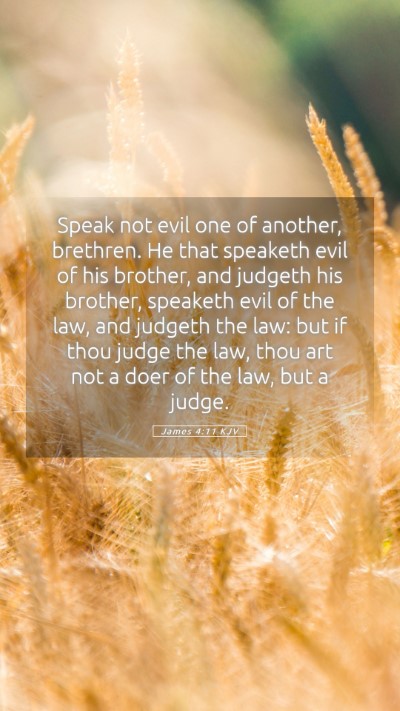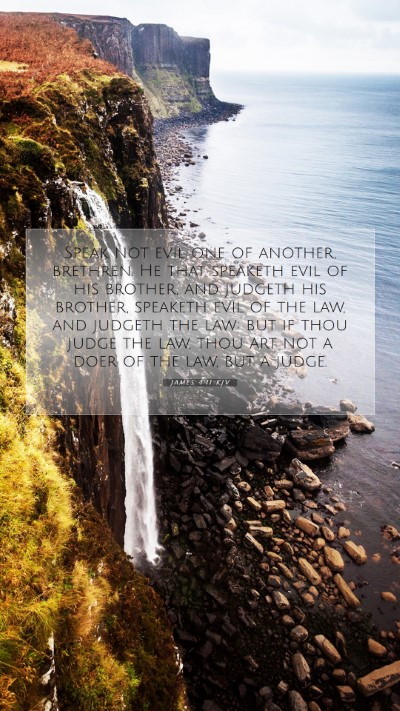Old Testament
Genesis Exodus Leviticus Numbers Deuteronomy Joshua Judges Ruth 1 Samuel 2 Samuel 1 Kings 2 Kings 1 Chronicles 2 Chronicles Ezra Nehemiah Esther Job Psalms Proverbs Ecclesiastes Song of Solomon Isaiah Jeremiah Lamentations Ezekiel Daniel Hosea Joel Amos Obadiah Jonah Micah Nahum Habakkuk Zephaniah Haggai Zechariah MalachiJames 4:11 Meaning
What is the meaning of James 4:11?
Speak not evil one of another, brethren. He that speaketh evil of his brother, and judgeth his brother, speaketh evil of the law, and judgeth the law: but if thou judge the law, thou art not a doer of the law, but a judge.
James 4:11 Bible Verse Meaning
Understanding James 4:11
James 4:11 states, "Do not speak evil of one another, brethren. He who speaks evil of a brother and judges his brother, speaks evil of the law and judges the law. But if you judge the law, you are not a doer of the law but a judge." This verse carries significant weight regarding the interpersonal relationships among believers and the overall moral framework that governs their actions.
Bible Verse Meaning
In this verse, James admonishes the faithful against the sin of slander and judgment among themselves. It illustrates a profound understanding of community ethics among Christians, emphasizing the importance of love and respect in interpersonal relations. Let’s explore the insights from several public domain commentaries.
Insights from Commentaries
-
Matthew Henry's Commentary:
Henry emphasizes that speaking ill of others is deeply destructive. It not only harms the individual who is being slandered but also undermines the community's fabric of faith. He notes that believers should be cautious in their conversations, as harsh words can effectively nullify the law of love that is central to Christian doctrine.
-
Albert Barnes' Notes:
Barnes points out that judging a brother implies judging the law, as the law commands love. He highlights that this act of judgment reveals a higher standard than what the law prescribes. Individual interpretations and judgments can lead to hypocrisy if they do not align with the spirit of charity that the law intends.
-
Adam Clarke's Commentary:
Clarke elaborates on the notion of 'speaking evil,' suggesting that it encompasses both gossip and slander. He warns that when believers engage in such behavior, they position themselves in a role that is not theirs—namely as judges of their brethren and the law. He argues that this is a grave error that disrupts spiritual harmony.
Bible Verse Interpretations
James 4:11 serves as a reminder to adhere to principles of respectfulness, kindness, and forgiveness. When understanding Scripture, it’s essential to recognize how these principles apply in both personal scenarios and broader church contexts. Let's break this down further:
- Judgment vs. Compassion: The verse warns against a judgmental attitude that can lead to division and strife among believers.
- The Law of Love: It reinforces the idea that the greatest commandment is to love one another. Slander directly contravenes this principle.
- Spiritual Responsibility: Believers are called to uphold high standards in how they speak about and treat one another.
Applying Bible Verses to Daily Life
Understanding the significance of James 4:11 is crucial for practical application in daily life. Every aspect of communication must be reflective of one's faith. Here are some practical reflections:
- Self-Examination: Individuals should consistently reflect on their words and whether they build others up or tear them down.
- Promoting a Positive Environment: In Bible study groups, fostering an atmosphere where discussions are constructive is vital.
- Seek Reconciliation: When disagreements arise, approach them with the intent to restore rather than to condemn.
Historical Context of Bible Verses
The book of James is attributed to James the brother of Jesus, and it was written to address concerns about faith and behavior among early Christians, who were facing external persecutions and internal disputes. Understanding the context in which this verse is placed provides a deeper insight into its urgency and applicability.
Additional Bible Cross References
- Matthew 7:1-5: A warning against hypocritical judgment.
- Romans 14:10: Encourages believers not to judge one another but to focus on their own faith.
- 1 Peter 2:1: An exhortation to rid oneself of malice and slander.
Conclusion
In summary, James 4:11 serves as a passionate appeal for believers to avoid sinning against each other through malicious speech and judgment. Understanding this verse promotes a deeper engagement with community ethics and the law of love that defines the Christian faith. It challenges us to reflect on our behaviors and fosters a nurturing environment conducive to spiritual growth and unity within the body of Christ.


